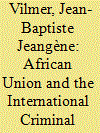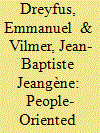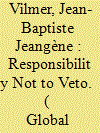|
|
|
Sort Order |
|
|
|
Items / Page
|
|
|
|
|
|
|
| Srl | Item |
| 1 |
ID:
148465


|
|
|
|
|
| Summary/Abstract |
In October 2016, South Africa became the first nation to withdraw from the Rome Statute of the International Criminal Court (ICC), after Burundi began taking steps to leave it. Kenya is likely to follow, and other states, like Uganda, could take the same cue. The ICC is facing the most serious diplomatic crisis of its history, with the African Union (AU) denouncing double standards, neo-colonialism and ‘white justice’, and regularly threatening to withdraw from the Rome Statute en masse. This article adopts both an interdisciplinary and a pragmatic policy-oriented approach, with the aim of producing concrete recommendations to counteract the crisis. It firstly outlines the context of this crisis which, although not new, is becoming increasingly serious. It then responds to the AU's objections to the ICC. The court's ‘Afro-centrism’ is explained by objective facts (the occurrence of mass crimes taking place on the African continent, the large number of African parties to the Rome Statute, the principle of complementarity) as well as by subjective decisions (a convergence of interest between the African leaders who brought the cases to the court themselves to weaken their opponents, and the prosecutor who needed quickly to find cases). Afro-centrism should also be nuanced, as the ICC has already shown an interest in cases outside Africa and the extent to which it is a problem is a matter of perspective. The article also responds to the ‘peace vs justice’ objection, and emphasises that African states were instrumental in creating and sustaining the ICC. It finally formulates recommendations to ease relations between the ICC and AU, such as to investigate more outside Africa, reinforce African national jurisdictions, create intermediary institutional structures, promote regional-level action, and rely more on ICC-friendly African states and African civil society.
|
|
|
|
|
|
|
|
|
|
|
|
|
|
|
|
| 2 |
ID:
169182


|
|
|
| 3 |
ID:
162016


|
|
|
|
|
| Summary/Abstract |
The responsibility not to veto is the idea that the Permanent Five at the UN Security Council should voluntarily refrain from using their veto in the event of atrocities. There are currently three veto-restraining initiatives, one of them from a P5 member, France. Despite its importance in diplomatic and UN circles, this debate has attracted little academic attention. This is partly because of the difficulty to access primary sources such as the details of the French proposal that circulated among the P5. Empirically focused and using diplomatic archives and experience, this article intends to fill such a gap. It provides the most detailed picture of the RN2V genealogy to date while offering a behind-the-scenes perspective on how the idea emerged and developed inside the French administration. It then unpacks the French strategy, its motivations and diplomatic efforts toward the P5, Group of 4, other states, and nongovernmental organizations, and eventually makes four recommendations for the initiative to have a chance of progressing among the Permanent Three.
|
|
|
|
|
|
|
|
|
|
|
|
|
|
|
|
|
|
|
|
|